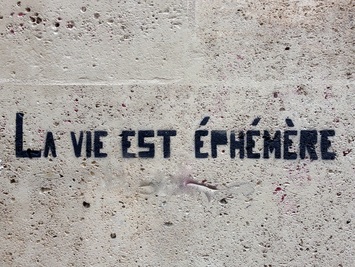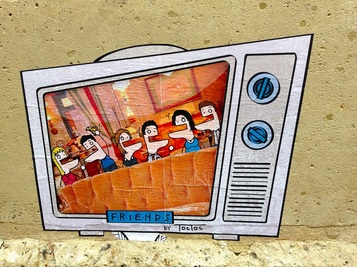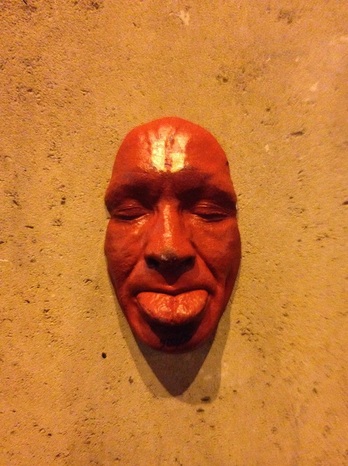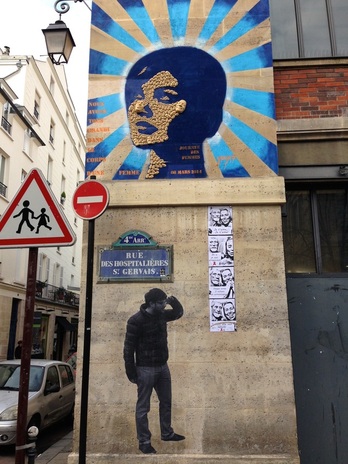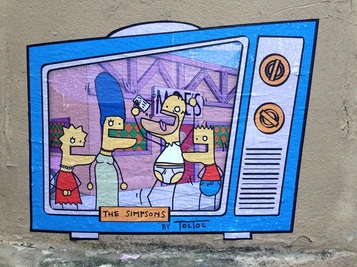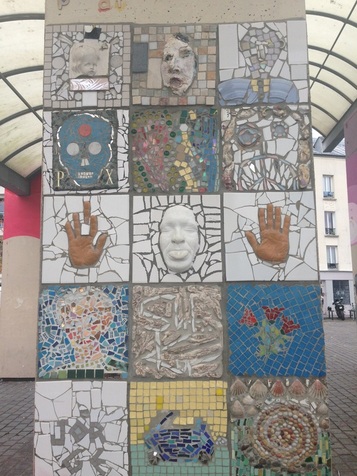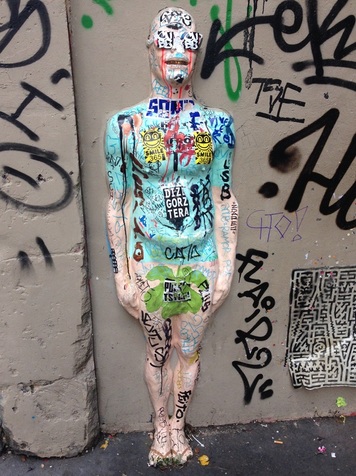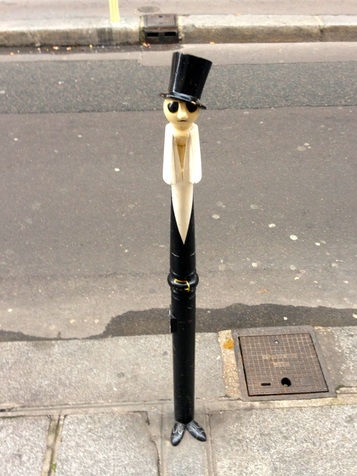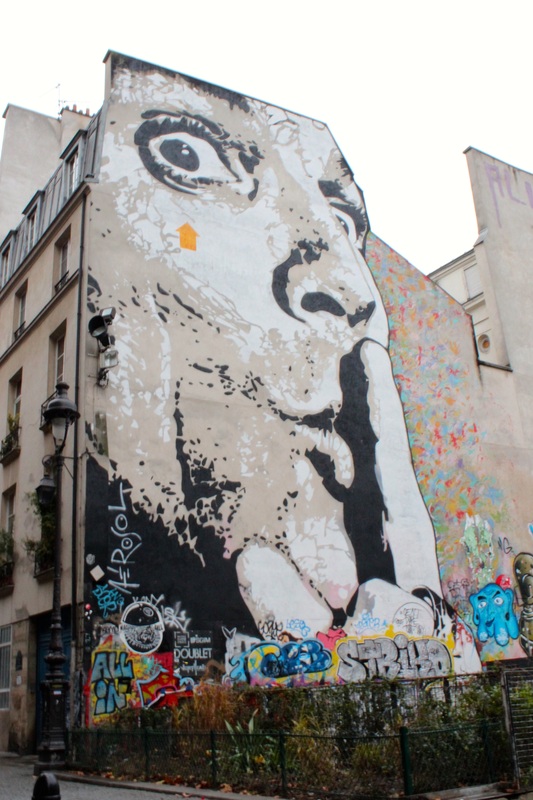13) ANGER
|
Anger. What a fascinating thing it is. It’s here now so it feels like a good opportunity to explore it some more, to examine the anatomy of anger in more detail.
What causes anger? Where does it come from? What is it made of? Why is it here now but not at other times? Where does it go when it’s not here? Should it still be here now? Is it appropriate? Should it be fully allowed, or is it sometimes necessary to suppress it? I've just returned home from un incident public wherein I became the antagonist of un petit conflit dans le Boulangerie, avec beaucoup des gens regardent. Très embarrassé. Merde!! It’s grey and cold in Paris today, raining on and off; December, nothing more to say. I think I’m getting used to the winter, however, as I’m not feeling the cold as much as I was a few weeks back despite the temperature actually being significantly lower. It's my first true experience of a northern winter, and it's a steep learning curve, particularly when it comes to layering clothing. I have a few errands to run in the local Beaubourg neighbourhood today so I put on my outdoor apparel in preparation. This consists of a stylish black quilted Paul Smith winter coat, a très shabby chic floral scarf tied in a French Knot method that Andy discovered online the day before, and stylish black leather gloves. I decide to go hat-free today; I won’t be out for long. The point of this rather mundane description is to indicate that I am dressed appropriately for a moderately stylish 50-year-old man, in Paris, in winter, in 2014. I could pass for a local . . . as long as I keep my mouth shut. Having lived in Paris for all of six weeks now, I occasionally notice some pride arising around thinking of myself as—and successfully passing for—a local. I smile and say bonjour to the prostitute soliciting on our cobble-stoned street each morning; I order my baguette in French from the Boulangerie a few doors further down; the waiter at my local café knows how I take my coffee; I have a local Epicerie, Fromagerie, Boucherie, and Poissonnerie where I buy our food; I speak French with a passable accent to everyone I come in contact with. It’s not universally successful, but my hit rate is on the rise. In the past few weeks I've discovered that there are three ways that the Parisians respond to my spoken French. The first—which is currently the most common—is with a sneaky little smile, a quick glance at me out of the corner of their eye, then: theycontinuetospeakinFrenchreallyreallyquicklysoit’simpossibleformetocatchwhatthearesayingunlessIknowwhatthey'regoingtosayinwhichcaseIcansometimespreemptthemandreplysuavely. “Ah, oui, oui. C’est vrai, n’est ce pas?” Of course, sometimes I get completely caught out because I’ve been asked for my drivers license, or some such thing, in which case we move onto the second way Parisians respond to my French. Here the look is one of complete puzzlement, like I’ve got two heads, or there’s a really big booger hanging out of one of my nostrils. This situation is usually resolved either with: “Merci. Au revoir. Bon journée,” as I wave and walk briskly away. Or—the more minimalist version—where I slink away silently whilst attempting to merge into the footpath or nearest wall, whichever’s more convenient, desperately avoiding eye contact with anyone in the vicinity. This last technique hasn’t been needed so much recently, but it came in very handy early on!! The third way that Parisians react to my spoken French is with the old ‘switch to English’ routine. This is most common amongst the younger generation. Generally, it's done without any acknowledgement; it’s just the way it is. Sometimes it feels helpful, sometimes arrogant. Mostly, it just feels natural. This third way that my spoken French is greeted by Parisians is how the young female shop assistant—let’s call her Angelique shall we—behind the counter at Boulangerie Julien in Beaubourg greets my French today. “Bonjour. Je voudrais deux piece de pizza, s’il vous plait. Un avec saumon, et un avec tomate et basille, merci beaucoup.” "Zzis one 'as 'am in it. Izz it OK?” replies Angelique in heavily accented English, pointing to the tomato and basil pizza with her tongs. “Yes, that’s fine,” I reply smiling. “Do you vont zzem ‘ot?” “Absolutely, it’s cold out today, n’est-ce pas?” My pizza is taken into the kitchen for heating, and I stand, awkwardly, trying to keep out of the way of the other customers in the small crowded Boulangerie. As it’s raining lightly outside at present, the usual neat queue—that's frequently out the door and down the street—is a little more bunched up and crowded inside the shop today. I amuse myself by looking at the dazzling array of cakes and pastries—each one a miniature work of art—filling the display cabinets of this popular cake-shop and bakery chain. Surreptitiously observing the lunchtime crowd also helps pass the time. Mostly young and fashionably dressed Parisians; no tourists today. Around ten minutes later I start to wonder if my pizza may be 'ot yet, so I look to Angelique who's scurrying around dispensing quiches and sandwiches, baguettes and pain au chocolat; I wait a little longer. About five minutes later I try to attract Angelique’s attention by waving tentatively in her direction. She doesn’t see me—or rather, she looks through me as though I am invisible—and continues rushing about the shop. A few more minutes pass, then I lean into the counter and say quietly in her direction as she rushes by: “Excusez moi mademoiselle. Est-ce que mon pizza . . .”--at this point my French language skills abandon me as I search desperately for the French word for ready—“. . . ,er, is it ready?” Well. It’s like I’ve told Angelique her hair is on fire, or that I have a fresh turd in a paper bag that I would like to hand her. She stands stationary for a few seconds, staring at me—or rather, staring through me—scowling. I can only assume she thinks I am trying to jump the queue or something. She purses her lips a little tighter, spins on her heel, and continues serving other customers. A few more, very long, minutes later I decide that I will try one last time—in English as our first exchange at the cash register seemed to have gone quite well in English. “Pardon me. Is my pizza ready yet?” I say to Angelique as she rushes past, a little louder this time. Oh. That doesn’t seem to have gone over very well. Angelique stops squarely in front of me. Plants both hands firmly on her hips, and then says loudly, in French, so that all 25 people in the small crowded store can hear her. “How dare you raise your voice at me?” You can hear a pin drop. Silence. All 50 eyes are on me. Even my own eyes try to look at me, to see my facial expression; priceless!! Suddenly, and inexplicably, rather than being invisible, as I have been for the past 20 minutes, I'm the focal point, and presumed perpetrator, of ‘drama’. I hold my breath, not quite believing what is happening. No one dares move or say a word. Angelique is seething with rage—an unseen emotional wounding from her past apparently triggered by my presence. I slowly look around at the staring faces, some broadcasting their own anger and hatred towards me, others dazed and frightened, still others simply embarrassed. OK. How am I going to get out of this one. My mind decides to resort to the technique which historically has been most successful when I need to express myself in French to someone who doesn’t understand any English. It involves speaking, in French, very slowly, enunciating each word and syllable very clearly, and in so doing sounding much like a six-year-old in a remedial reading class: “Lay dur pee-ess der pit-zar, key jay ash-tay a voo per-tet-trer der-pwe canz mee-nwee, key voo-zar-vay . . .”—what’s the past participle of mettre? met? mu? bloody irregular French verbs—“. . . PUT, that you have put . . . don ler fu-wer don ler kwi-seen? Is it ready?” Silence. Seething. Loathing. Then, Angelique’s eyes widen just a fraction, and, actually seeing me for the first time, whispers under her breath: “Merde!” The expletive is whispered just softly enough that no one else in the store, apart from myself, hears it. Then, clasping both of her hands to her mouth she rushes around the end of the counter, out of the shop, and into the street. An awkward silence ensues. The customers in the store remain silent, but now they are looking at each other, gesturing to see if anyone knows what’s going on, and wondering what on earth is going to happen next. A few mumbled conversations start between the other employees of the boulangerie, then Angelique rushes back into the shop . . . carrying my pizza. As I walk back to our apartment I'm angry. My mind, as it does, lets loose a volley of judgments about Angelique and the French culture generally, vocalizing them loudly to no one in particular. A few 'f#*&ing French arseholes' are incorporated in the monologue . . . then I laugh at the absurdity of it all, and let these angry thoughts dissipate. I could explain why the anger is here now by attaching the above story to it, pointing out that it was someone else’s fault, and thereby projecting my own unhealed control and anger issues onto that person. This, however, would merely be a replaying of unhealthy, and frankly unhelpful, egoic patterns aimed at strengthening my own contracted and suffering individual sense of self. Tried it. Read the book. Saw the movie. Bought the T-shirt. It doesn't work!! No thanks!! I could explain why the anger is here now by blaming myself. A victim of my upbringing and conditioning, confirming my own personal shortcomings and inadequacies. It would then be just a short jump to that all too familiar place of worthlessness and shame—that I know so well—that resides deep inside me, beneath the anger. I could dive into that endless ocean of shame, fall through into the bottomless pit of despair that lies beneath it, and wallow in the pain and drama of my life one more time. No thank you!! No, it’s just anger. It is a certain type of energy that is currently coursing throughout my body. It's particularly concentrated around my head at the moment. It was activated by a series of circumstances, yes, but now . . . it’s just here. It feels very familiar, and it's not pleasant. Usually when anger is here it's somehow out of control. It comes in a flash, and as such it's actually not very easy to examine in detail as it arises. As I inquire into this energy that's in my body right now, a word comes into my mind that in some way describes this energy: Justice. It feels like this energy is what’s behind the arising of the Platonic form of Justice. If this energy, this anger, is allowed to be fully present in my body with no attempt to suppress it, and if it is not spat out and expressed unconsciously, and if it is directed appropriately—with presence, equanimity, and compassion—then it is a powerful force that can lead to positive change in the world. If, however, it is co-opted by the mind, distorted and used inappropriately, then it is simply dangerous, and leads to harm, both physical and psychological, to myself, to others, and to the environment. Anger isn’t wrong; it’s part of the experience of living in a human body. Anger can protect us from harm by fuelling the ‘fight’ side of the ‘fight-or-flight’ response. Anger, however, can also be the motivating force behind social change, and the fire to light beacons for equality, freedom, and dignity for all beings. Finally, anger is nothing more than one of the infinite manifestations of Being, of Love, a part of the play of leela . . . Angel Stevie Paris, December 8th, 2014. |
